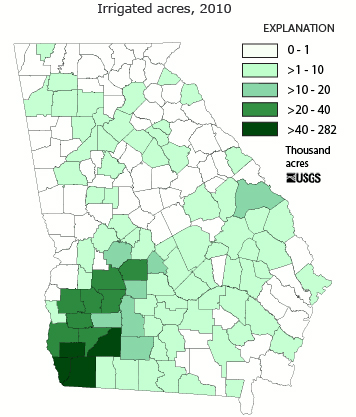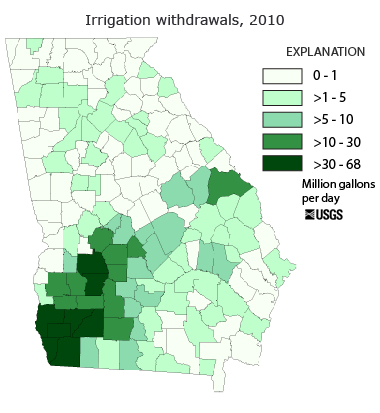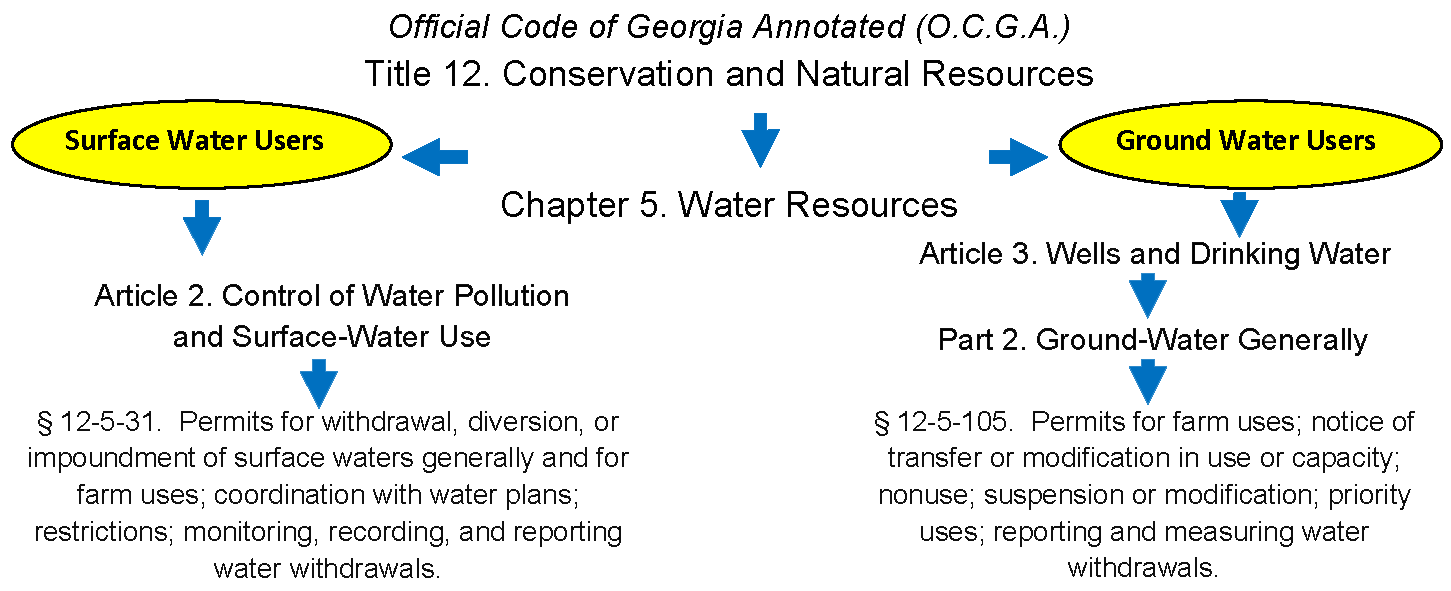

Following a series of severe water resource management challenges in Georgia in the first decade of the 2000s (e.g., rapid growth, frequent droughts interrupted by acute flooding, and legal court rulings that affected water withdrawals from Lake Lanier), the General Assembly enacted the Georgia Water Stewardship Act during the 2010 legislative session.
Based on recommendations from the 2009 Governor's Water Contingency Task Force, the legislation begins a process for developing alternative fresh water supply sources while also reaffirming "the imminent need to create a culture of water conservation in the state of Georgia."
Two key provisions of the Water Stewardship Act affect Georgia farmers' use of surface and ground water through state withdrawal permits.
It is imperative that Georgia's agricultural community fully understand these provisions and be prepared to work cooperatively with state agencies, regional commissions and local governments to ensure Georgia agriculture remains a viable and sustainable enterprise in the years to come.
This publication provides an overview of the Water Stewardship Act's major provisions affecting Georgia farmers and their use of the state's most precious resource: WATER.
For More Information on agricultural water use by Georgia farmers visit website:
Farmers Using Surface Water
The Official Code of Georgia (GA Code) states that no person shall make any withdrawal, diversion or impoundment of any of the surface waters of the state for whatever use without obtaining a permit from the Georgia Environmental Protection Division (EPD; part of the Georgia Department of Natural Resources) if such withdrawal is more than 100,000 gallons per day (based on a monthly average).
The Water Stewardship Act revised some key provisions dealing with the categories of farm use water withdrawal permits, as well as permit definitions and requirements.
Key Definitions
- Farm uses:
- Irrigation of any land used for general farming, forage, aquaculture, pasture, turf production, orchards, or tree and ornamental nurseries.
- Water supply for farm animals, poultry farming or any other activity conducted in the course of a farming operation.
- The processing of perishable agricultural products and the irrigation of recreational turf (except in the Chattahoochee River watershed upstream from Peachtree Creek, where irrigation of recreational turf shall not be considered a farm use).
- Surface water(s), i.e., "Surface water(s) of the state": Any and all rivers, streams, creeks, branches, lakes, reservoirs, ponds, drainage systems, springs producing in excess of 100,000 gallons per day, and all other bodies of surface water, natural or artificial, lying within or forming a part of the boundaries of the state that are not entirely confined and retained completely upon the property of a single individual, partnership, or corporation.
- Withdrawal: Taking away surface water from its natural course (EPD Rule 391-3-6-.07).
- Diversion: Turning aside or altering of the natural course of surface waters.
- Impoundment: Storing or retaining surface water by whatever method or means.
Farm Use Surface Water Withdrawal Permits (GA Code Section 12-5-31)
The Water Stewardship Act added a new subsection to Section 12-5-31 of the GA Code. The new subsection established three categories of farm use surface water withdrawal permits:
- Active: A permit that has been acted upon and used for allowable purposes.
- Inactive: A permit holder has requested inactive status in order to retain ownership of an active permit for possible future use or reuse. Inactive permits shall be retained by the permit holder without modification. An inactive permit shall be reclassified to an active permit when the permit holder has given the EPD 60 days written notice and paid the applicable fees.
- Unused:
- A permit that has never been used for allowable purposes. Unused permits shall expire in 2 years unless changed to active or inactive status. Unused permits cannot be transferred or assigned to subsequent owners of properties.
- The EPD is required to notify a permit holder twice by certified mail that their permit has been determined to be unused. The permit holder has 120 days from the date of the second notice to respond to the EPD.
- 2 years from the date the EPD first notified the permit holder of the unused determination of the permit, the EPD shall revoke the permit if the permit holder has not requested that the unused permit be reclassified as inactive or active.
Farmers Using Ground Water
The Official Code of Georgia (GA Code) states that no person shall make any withdrawal, obtain, or utilize ground waters in excess of 100,000 gallons per day for any purpose without obtaining a permit from the Georgia EPD (Environmental Protection Division of the Georgia Department of Natural Resources).
The Water Stewardship Act revised some key provisions dealing with the categories of farm use ground water withdrawal permits, as well as permit definitions and requirements.
Key Definitions
- Farm uses:
- Irrigation of any land used for general farming, forage, aquaculture, pasture, turf production, orchards, or tree and ornamental nurseries.
- Water supply for farm animals, poultry farming or any other activity conducted in the course of a farming operation.
- Includes the processing of perishable agricultural products and the irrigation of recreational turf, (except in the Chattahoochee River watershed upstream from Peachtree Creek, where irrigation of recreational turf shall not be considered a farm use).
- Person: Any and all persons, including individuals, firms, partnerships, associations, public or private institutions, municipalities or political subdivisions, governmental agencies, or private or public corporations organized under the laws of this state or any other state or country.
- Ground water: Water of underground streams, channels, artesian basins, reservoirs, lakes, and other water under the surface of the earth, whether public or private, natural or artificial, which is contained within, flows through, or borders upon the state of Georgia or any portion thereof, including those portions of the Atlantic Ocean over which this state has jurisdiction.
Farm Use Ground-Water Withdrawal Permits (GA Code Section 12-5-105)
The Water Stewardship Act added a new subsection to Section 12-5-105 of the GA Code. The new subsection established three categories of farm use surface water withdrawal permits:
- Active: A permit that has been acted upon and used for allowable purposes.
- Inactive: A permit holder has requested inactive status in order to retain ownership of an active permit for possible future use or reuse. Inactive permits shall be retained by the permit holder without modification. An inactive permit shall be reclassified to an active permit when the permit holder has given the EPD 60 days written notice and paid the applicable fees.
- Unused:
- A permit that has never been used for allowable purposes. Unused permits shall expire in 2 years unless changed to active or inactive status. Unused permits cannot be transferred or assigned to subsequent owners of properties.
- The EPD is required to notify a permit holder twice by certified mail that their permit has been determined to be unused. The permit holder has 120 days from the date of the second notice to respond to the EPD.
- 2 years from the date the EPD first notified the permit holder of the unused determination of the permit, the EPD shall revoke the permit if the permit holder has not requested that the unused permit be reclassified as inactive or active.
For More Information
For information about obtaining a Water Withdrawal Permit, visit the Georgia EPD website: .
For information on Georgia law relating to Farm Use of Surface and Ground Water, visit the .
To find the sections relevant to your situation under the Official Code of Georgia Annotated (O.C.G.A.), look for Title 12, Conservation and Natural Resources; Chapter 5 deals with Water Resources. (This is visually represented in the figure below.) From there, if you are:
- a surface water user, go to Article 2, Control of Water Pollution and Surface-Water Use, §12-5-31: Permits for withdrawal, diversion, or impoundment of surface waters generally and for farm uses; coordination with water plans; restrictions; monitoring, recording, and reporting water withdrawals.
- a ground water user, go to Article 3, Wells and Drinking Water; then Part 2, Ground-Water Generally, §12-5-105. Permits for farm uses; notice of transfer or modification in use or capacity; nonuse; suspension or modification; priority uses; reporting and measuring water withdrawals.

The Water Stewardship Act is intended to demonstrate Georgia's deep commitment to the conservation of critical freshwater supplies. Given the context of multi-state negotiations over the allocation of water resources and the potential return of severe drought conditions, it is incumbent upon Georgia's state agencies and local governments to implement the new law's provisions in a timely and efficient manner. Effective planning and cooperation towards these ends will help to ensure that Georgia's water supply system can sustainably meet the needs of economic development in the state, while also maintaining adequate flows that satisfy the needs of downstream users in both Georgia and its neighboring states.
Acknowledgements
The at the University of Georgia works with public officials throughout Georgia and around the world to improve governance and people's lives. Drawing upon the knowledge and resources of the University of Georgia, the Institute provides education, assistance, research, policy analysis, and publications to assist public officials in serving citizens in Georgia and throughout the world.
This circular originally was co-authored by Brian Kiepper (Bio & Ag Engineering and Poultry Science, CAES) and Jason Evans (Carl Vinson Institute of Government) at the University of Georgia. Special thanks to the following individuals for input and review of this publication: Sheryl Wells (Bio & Ag Engineering) and Casey Ritz (Poultry Science), University of Georgia; Tatiana Borisova, University of Florida; and Alice Miller Keyes, Georgia DNR — Environmental Protection Division.
Status and Revision History
Published on Jan 06, 2011
Published on Jan 18, 2011
Published with Full Review on Apr 24, 2014
Published with Minor Revisions on May 15, 2023
